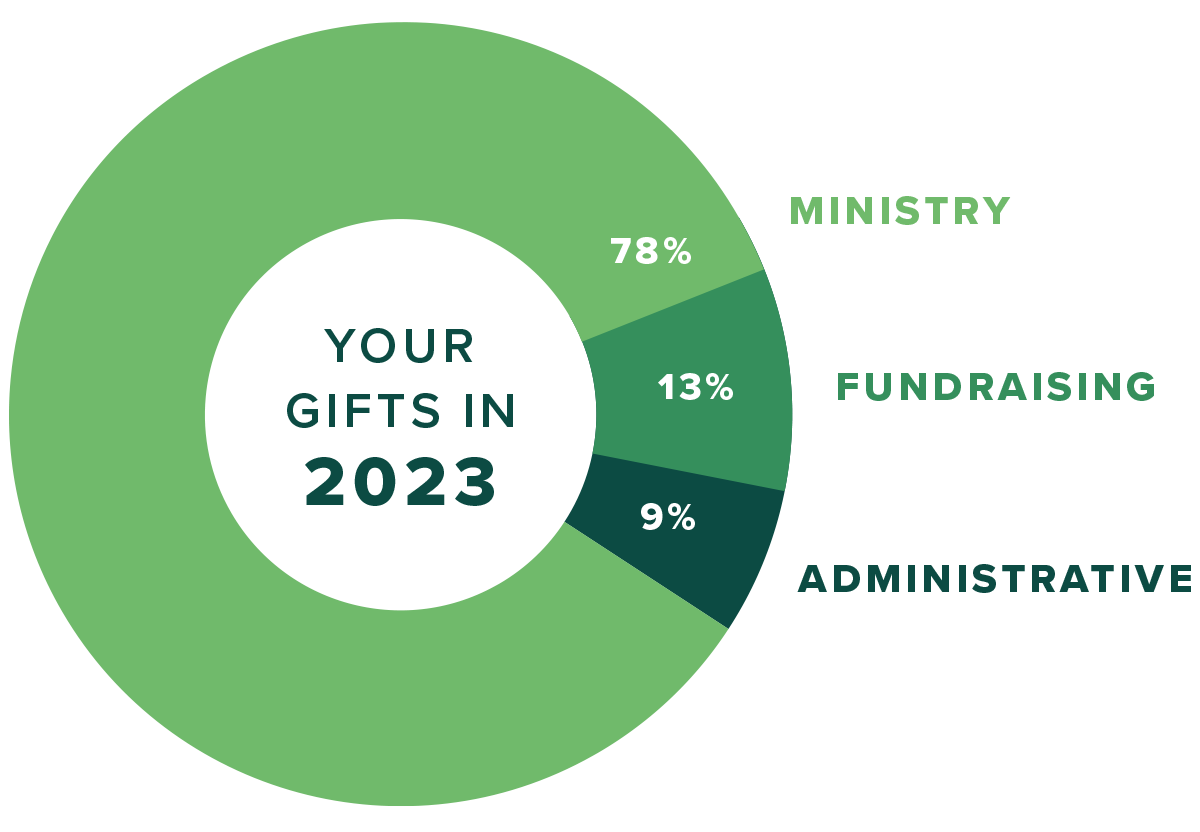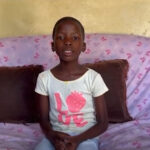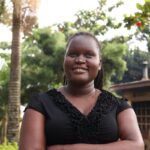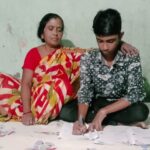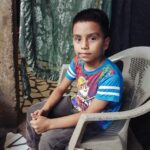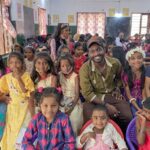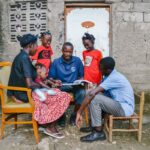A Child Champion’s difficult childhood motivates him to passionately serve kids living in poverty in his community. He advocates for kids in Turkana, Kenya, to be educated.
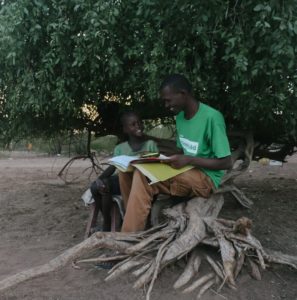
As a Child Champion today, Justus helps kids in his village with their education so they can hope for a future beyond herding livestock.
As a child, Justus Lomuria realized that their family had a mother but no father.
He later was told that his father, while herding their livestock, was attacked and killed during a cattle raid by a neighboring community, and some of their livestock were stolen by the bandits. This was before Justus was born.
Justus and his two siblings together with their mother lived in Lokori, a small village, in Turkana County, the poorest region in Kenya.
Turkana is 330 miles north of Nairobi, Kenya’s capital. It is hot, arid, and sandy, with temperatures ranging between 68- and 104-degrees Fahrenheit. The Turkana community are nomadic pastoralists, or herders.
After the loss of Justus’ father, his elder brother, who had been taught how to herd cattle by their father, took over the herding role.
Traditionally in the Turkana culture, it is believed that boys are born leaders, and as soon as they learn to walk, they are initiated into herding. They first accompany their fathers’ herding, and as they learn, they are left in charge of goat kids. As they grow older, they are allowed to herd goats, sheep, and camels.
The eldest boy is the first to be initiated and is further taught how to care for the family and protect it from external attacks, mostly from rustlers. They are taught how to spot a rustler from a distance, how to defend themselves when a fight breaks out, and how to identify a safe grazing zone for their livestock.
They are also expected to step up and play father roles if the father of the family dies.
Education Not Always Embraced
With his brother caring for the livestock, Justus was left at home to help his mother with house chores. This allowed his mother to send Justus to school as his brother went herding.
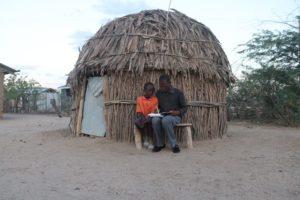
Justus helps a child with reading while on a home visit.
Justus’ mother was unable to also send Justus’ elder brother to school because of influence and pressure from their extended family.
Traditionally, in the Turkana community, women are to be seen and not heard, and their opinions over societal issues never count. The men make the decisions for the women and the kids. Any attempt to overturn the men’s decision is believed to attract a curse that could lead to death.
“My brother had to herd because my uncles wanted him to care for our late father’s wealth, the livestock. We would have risked losing all our animals to our uncles if he was sent to school because they would have believed we chose education over the family wealth,” Justus says.
Education is traditionally frowned upon by the Turkana. They believe it brings more loss than gains to their children and their generations after.
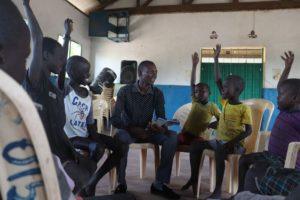
As a teacher, Justus mentors and encourages the kids at the Lokori Hope Center.
The boys in the community are charged with the responsibility of caring for the animals, which would in turn be handed over to them as they grow older and have families of their own. The animals, too, are used to pay dowry.
The girls are viewed as a source of wealth because families can receive a lot of livestock as dowry settlements when the girl is married off.
Medical Care Out of Reach
When Justus had just joined the school, his mother remarried and had a baby girl.
When he was 6, Justus lost his little sister, then his mother, to an illness. He says they never knew exactly what his mother and sister suffered from because then their village had no health facility and the closest facility was a hospital in Lodwar, 96 miles away.
Despite his mother and sister’s ailing, they could not afford to take them to the hospital because there were no public transport vehicles from their village to the hospital.
Currently, with the availability of more public transport vehicles and good roads, a journey to and from Lodwar costs the equivalent of $24. Most families in the area cannot afford the transport because they live on less than the equivalent of $2 a day, which goes toward purchasing food.
The village has only a dispensary that is meant to serve everyone in the community. Residents still have to travel to Lodwar for treatment of major illnesses, making health care in the area unaffordable to most in the community.
With his mother gone, Justus, his elder brother, and their livestock were forced to move in with an uncle who promised to care for them. His brother continued herding as he went to school.
However, life became tougher for them.
Child Champions Step in to Help
“Love and care went to the grave with our mother,” Justus says. “It was so common for my brother to go herding on an empty stomach, and on return home, he would find nothing to eat. For me, food was assured of in school. I took all my lunches in school, so I never minded coming home to nothing in the evening. What kept me going was the following day’s meal at school.”
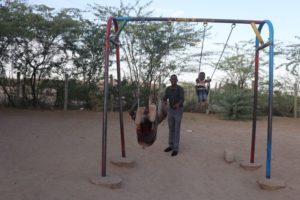
Justus pushes some children on swings at the Hope Center.
Justus says not only was food hard to come by, so were clothes, shoes, and the examination fee required by the school before taking an exam.
However, his teachers were kind and allowed him to sit exams despite having not paid the fee, which was then 50 cents.
Luckily for Justus, the nonprofit ministry OneChild that visited his village took him in and sponsored his primary school education. Child Champions also provided him with a school uniform and food that he would share with his brother.
His brother, however, was also hungry for education.
In 2003, Justus’ brother slowly began sneaking into school in the afternoons after herding. After months of sneaking into school, his brother, who was a class behind him, was at the top of his class at the end of the year’s exams.
This encouraged him to continue attending school, and then a good Samaritan who was visiting their village offered to sponsor Justus’ brother through primary school education.
However, when their uncle heard tell of Justus’ elder brother sneaking to school, he was furious. He sold off livestock that was left behind by Justus’ late parents and never used the money to pay school fees or cater to the boys’ basic needs. He also stopped caring for them.
Becoming an Advocate for Kids
Despite the struggles at home, the two boys excelled in their primary school education and moved on to high school. Justus moved to live with one of his other uncles who sponsored his high school education in a different county away from home, as his brother joined a high school in Turkana.
On completing high school, Justus wanted to pursue teaching, his dream career.
“My life in high school was better than it was in primary school, thanks to my uncle who took me in,” he says. “But despite being in a better place, my mind could not stop thinking about the children from my village. I wondered what would become of them if no one stood in the gap for them.”
Like Justus, most kids in his community, orphaned or not, struggle to get basic needs. It is common for a child who doesn’t attend school to have one meal a day or maybe have just raw goat milk. The situation is harder for kids who lose their parents either to disease, natural death, or at times cattle rustling, which hugely affects the community.
The constant thought of how children in his village would be saved pushed Justus to study teaching. He hoped that he would mentor and encourage kids, and together with his brother become a force to reckon with in their community.
Justus, now 27, says, “I wanted to be of influence to my community to advocate for education which gives kids a chance to dream. My community needed someone to advocate for the future of the kids.”
In 2016, Justus joined OneChild as a Child Champion. He serves kids at Lokori Hope Center.
Education As an Equalizer
Today, thanks to the OneChild sponsorship program, kids in Turkana attend school because the Hope Centers annually provide them with books, school uniforms, and food, and they can now sit for exams because the exam fee is paid for.
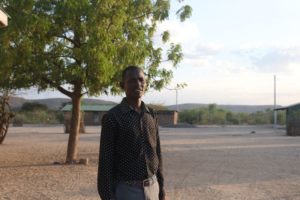
Justus has become an advocate for kids in his community to get an education.
As a Child Champion, Justus and his colleagues at the Hope Center have stepped up to reach out more to the community. Justus says they visit the enrolled kids’ homes and talk to the caregivers about the importance of education.
He also says they go a step further to encourage parents to provide a friendly environment for the kids to thrive in while at home.
“The Hope Center is a place where kids find solace, and they can dream because they are in a safe space. Unfortunately, most of these kids would be coming from homes where the adults are drunkards who fight all the time, or the adults do not treasure education,” says Justus.
“It is difficult for the kids to stay positive at home as they do while at the Hope Center, and this is why we choose to address the root cause of the problem, which is at home. It’s beautiful to see most parents reforming and choosing to be Child Champions at home.”
Justus also visits the kids in schools to check on their performance. At school, he helps them know what areas they could improve in and how they can choose their careers based on the subjects they are good at.
“Education is important, it is an equalizer, and that is why the Turkana kids need to attend school,” Justus says.
Traditionally, wealth, which was livestock, only belonged to the father of a family and would be shared with the boys when they grew older. Women and girls were not allowed to own any of it. However, it would only take a single cattle raid for a family to be thrown back into abject poverty.
“Unlike animals, no one can steal away the knowledge gained in school,” Justus says. “And with the knowledge, regardless of gender, one can acquire the animals in the future and still be knowledgeable to source for wealth in a different way. This is what I pray that everyone in my community understands.”
Give a child living in a hard place like Turkana hope by sponsoring today!
We are accountable to the children we serve AND to our donors.
Our accountability to our donors is one of our highest priorities. Our goal is to use the funds entrusted to us as wise stewards. To do this requires continued monitoring of our fund distribution. OneChild is also a member in good standing with the Evangelical Council for Financial Accountability (ECFA)
